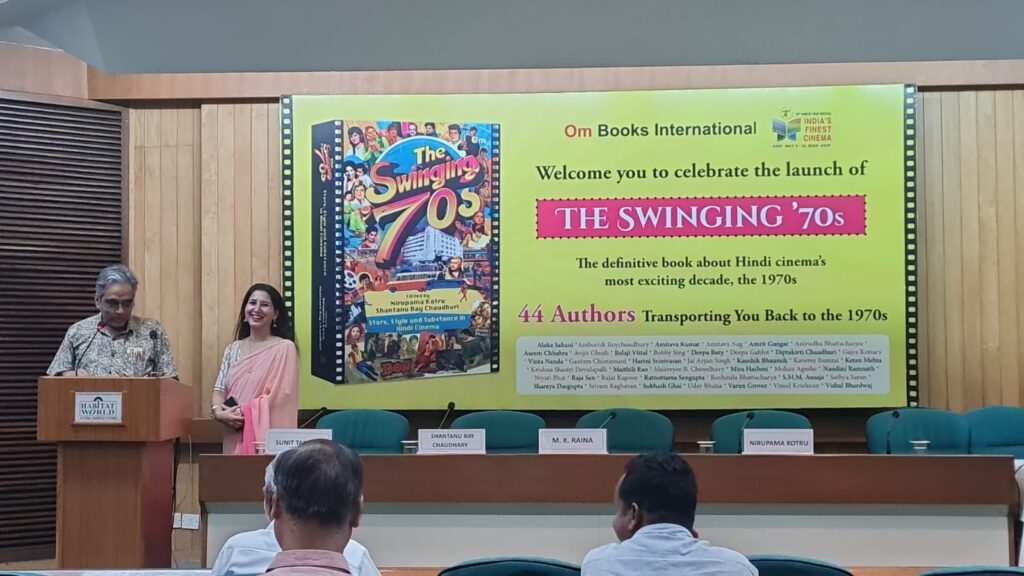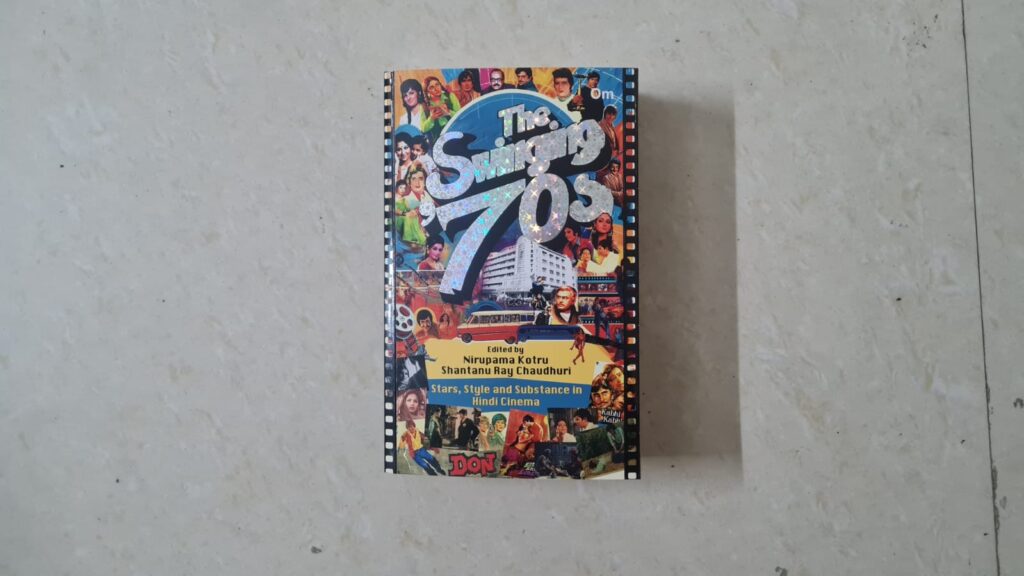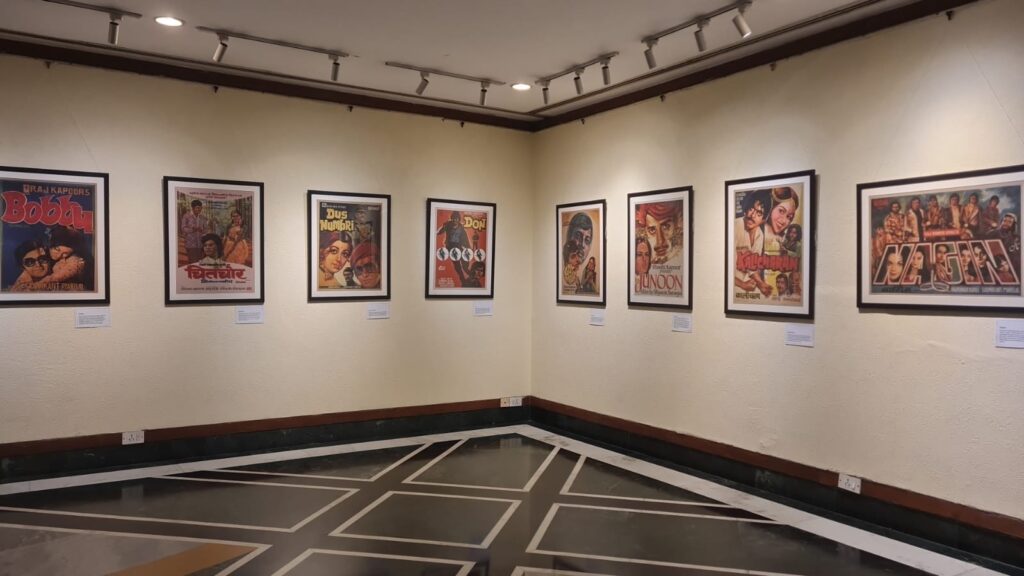On 4th May 2024, I had the privilege of attending the Delhi Launch of The Swinging Seventies, edited by Shantanu Ray Chaudhury and Nirupama Kotru. The cover of the book immediately piqued my interest with its vibrant colours, evocative vibes, and the multitude of actors depicted on it. Although I’ve never been a cinephile, this event only served to deepen my curiosity about the book.

As Nirupama Kotru expressed, the book boasts articles from individuals directly involved in cinema, as well as those impacted by it and those who experienced the cinema of the 70s firsthand. This eclectic mix makes the book a blockbuster in its own right.
At the event, ten contributors and both editors graced us with their presence for the book unveiling, although the panel could only accommodate seven. Avjit Ghosh, Aseem Chhabra, Gautam Chintamani, Jai Arjun Singh, Kaveree Bamzai, and Uday Bhatia, alongside Nirupama Kotru, captivated the audience with their essay topics and nostalgic recollections of the 70s. For me, this launch was an enlightening experience, offering insights into an era and dialogue I had previously been unaware of.

First and foremost, I commend Shantanu and Nirupama for assembling such a diverse group of contributors who made this book a reality. Their dedication and hard work brought together 40 individuals, or as Shantanu sir referred to them, his “chaalees chores”, each shedding light on different facets of the 1970s. As highlighted by the contributors present, the editors reached out based on experience, motivating each to contribute an article.
M.K. Raina set the tone for the event by acquainting us with the era, sharing remarkable anecdotes and personal experiences with the actors of the time. His narratives transported us back in time, setting the stage for an evening immersed in nostalgia. The event was off to a great start as I could already feel myself being pulled into that era. I wanted to never leave, to keep listening to all these stories that these wonderful people had to share.
The event sparkled with star power as each contributor shared their thoughts on the book. Bobby Singh emphasized the importance of the youth understanding the golden age of cinema, a sentiment I now wholeheartedly share. He has written an article on the role of vinyl and cassettes in promoting the cinema of the 70s. According to him, it was very necessary to document this era in the presence of the people who had actually lived and watched it to make it available for the following generations.
Kaushik Bhaumik echoed this sentiment, lauding the book as a vital resource for future generations to comprehend the era. According to him, this book is probably the only reference book on the 70s cinema. He has contributed an essay on the music of R.D. Burman agreed with this view. When the world was too focused on the angry young men, Bhaumik was mesmerized by R.D. Burman and his music and finally got an opportunity to share his views on the same.
Nirupama Kotru elucidated her rationale for focusing on the 70s. Nirupama Kotru shared with us, her reason behind choosing the 70s for her book. As somebody who has been in charge of formal archiving, it was her hope that besides the movies, the promotional material and the songbooks, there should be a record of what the cinema of the time used to mean to people who were growing up in those days. For instance, we would never have known what the experience of a single-screen theatre with seating of over a thousand people felt like compared to the multiplexes that are common nowadays. She discussed that the 70s were the golden period of Indian Cinema because it had three kinds of cinema co-existing, the blockbusters, the Vimal roy films as well as films that won national and international awards.
Aseem Chhabra shared how the 70s shaped his personal and political consciousness, illustrating the profound impact cinema had on his worldview. It was a very important period for him personally as he completed his college and schooling in the same era. He recalls how his political education started at the time and the films of the 70s had a huge impact on his understanding of the period and the world around him, seeing all the actors for the first time, opened his eyes to a completely new world. It meant so much to him that he became a film journalist much later in his life but he carried with him that understanding of the cinema that he had gained.
Kaveree Bamzai delved into her admiration for Zeenat Amaan, whose on-screen persona challenged societal norms. As she saw Zeenat Amaan on the screen, she couldn’t fathom a woman in a white jumpsuit, visiting the temple for the first time. The magazines she read, furthered her interest in the field and made her fall in love with Zeeny Baby. She was fascinated by Zeenat’s desire to leave her carefree life and settle down.
Jai Arjun Singh reflected on the audio-visual experience of cinema in the 70s, noting the contrast between hearing and watching films. When he heard the dialogues, he was confused and bewildered about why the villains had such good dialogues, why they sang the songs and how some conversations were happening between the hero and the villain. He shared how hearing the cinema and watching it, presented two completely different viewpoints to him. He mentioned how nowadays when so many trailers are already out in the world before the movie is released, some of the mystery of the movie has been lost as you already have an idea of what the movie is about.
He mentioned how, if you want to have an idea of the versatility of the book, you should read two pieces back to back, Shriram Raghavan’s piece on Guilty Pleasures and Rajat Kapoor’s piece on Duvidha which was a masterpiece of a movie.
Gautam Chintamani applauded the diversity of essays in the book, drawing parallels between the 70s and contemporary cinema. To name one such difference in the cinema, many times the actors of the era weren’t even aware of what they had to do, they were the directors’ puppets but also respected and revered them. Unlike, current times where most of the time, the actors can even change the scenes as they wish.
Uday Bhatia reminisced about the cinematic experiences of his youth, emphasizing the impact of watching films in theatres. According to him, many of the movies had the impact that they had on him, just because he had seen them in the theatre. He has also written an article in the book on the opening credits of the cinema and the role they played in attracting your attention and capturing it till the end of the movie.
Avijit Ghosh highlighted the unsung stars of the 70s, underscoring their lasting influence despite limited commercial success. He mentions how everyone wants to reach the stars, these were the stars who touched the sky but couldn’t hold the stars. He also talked about the experiential aspect of cinema and how despite flaws like the voice lagging, he remembers the time of his life fondly.
Despite the wealth of anecdotes and insights shared, the audience, myself included, yearned for more. Questions poured in from attendees eager to engage with the contributors, underscoring the enduring allure of 70s cinema. However, due to time constraints, the session concluded with closing remarks from Shantanu sir. He has lived through the cinema of the 70s and related to each and every one of the essays as he visited those single-screen cinemas, listened to those cassettes and revered those heroes. He also has an essay on Gulzaar, the poet of the cinema as well as his grandmother and her memories of the cinema.
This eye-opening event has definitely raised my hopes for the book as I couldn’t wait to get hold of my copy and has turned a reader into a part cinephile. I hope that I was able to transfer some of the magic of the evening to you through this blog. And as they say, “picture abhi baaki hai mere dost”, so please wait for my review of the book.




Thanks for your review of the event, the book looks fascinating & I can’t wait to get hold of a copy.
I was brought up in London & the ’70’s were my formative years also. I have very fond memories of visiting our local cinemas on Sundays to watch Hindi Films. 😀
Thanks a lot! Many of the contributers also shared similar experiences. I hope you get your copy of the book soon!